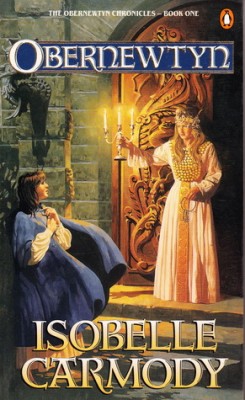
Twenty-six years after she began, Isobelle Carmody has published the final novel in this series. There are only seven books altogether, meaning she averaged almost four years per book, which, for something that was clearly not proof-read or subjected to any editorial process, is frankly unforgivable.
These books are exactly as bad as you think they are. The writing is clunky, the plot meandering, and the action is littered with unnecessary red herrings that fail to be resolved satisfactorily. And yet. Having started reading these novels at the tender age of I don’t really remember but probably like 14 or so, I can finally, FINALLY, put to death the part of myself that still cares about the characters that inhabit this fantasy universe.
And I do care about them. Briefly (ironic), this series takes place in a world in which a nuclear holocaust has all but wiped out life on earth. Pockets of human beings and animals survived basically by living in such remote areas that nobody thought to send warheads their way; this being the case, they live pre-industrial lives devoid of any modern conveniences. The “Land”, where most of the action takes place and where dwells our hero, is ruled by a despotic unelected government called the “Council”, and subject to the whims of a hypocritical religious order that wields significant political power. Into this world are born children with paranormal psychic abilities; since these are viewed as mutations caused by the holocaust (known as the “Great White”) they would, if discovered, be either killed outright or imprisoned. Obviously most of the main characters have such psychic abilities, and manage to establish a remote, secret community that harbours them and teaches them to develop their “Talents”. (I remember many years ago, discussing these books with a friend who was well into fantasy in any form, hearing him note that, although the books themselves were terrible, he quite liked Carmody’s “conception of magic” – I think that’s the best way of putting it that I’ve heard.)
Anyway, the main character, Elspeth, is one of the most Talented people in the Land (capitalisation in original), and discovers she has a secret quest to destroy the slumbering computer program that created the first holocaust, so as to avoid another, more complete, disaster. One of the (few) mercies of this book is that it avoids the usual trajectory of classic fantasy novels: namely, Farmboy Becomes Ultimate God-Warrior. The Obernewtyn novels, by contrast, are overtly feminist and obviously written by a committed hippie who believes in meditation, Tai Chi, vegetarianism, and living in harmony with the beasts of the earth. Not only is the hero (I won’t say heroine, because it’s honestly not accurate) a girl who becomes a woman, but so are the two people who, before the Great White, prophesied her coming and spent their lives leaving clues for her to disable the weapons. (Why didn’t they just do it themselves? DON’T ASK ME I STILL DON’T UNDERSTAND NOR AM I GIVEN A SATISFACTORY ANSWER.) The blind bird (yes, really) who psychically controls and directs the action in the present time, intervening through a number of other characters, is a female. Meanwhile, all of the bad guys in the book are expressly misogynistic, and all of the good guys (human and animal) are feminist allies who see their role as supporting Elspeth in her quest. So no, it’s not a subtle feminism. On the other hand, (a) it’s YA fantasy, so query what place subtlety has ever had there; and (b) in the world of fantasy, I’ll take whatever feminism comes my way.
I won’t recap any of the specific action of the new novel, since it would automatically contain spoilers for previous books in the series. In fact, I had not previously read either the sixth or the seventh book, and they’re easily the worst so far. If you hated the “walking around, still walking, just walking really, walking in a vaguely southerly direction” parts of The Lord of the Rings, I have bad news: walking around occupies the bulk of the last two novels in the series, and since they come out at 704 and 1120 pages respectively, it’s not a short stroll they’re taking. It’s a long, long, boring, questy eye-roller of a trek, which sadly was not subject to any red-pencilling that I could see.
The good news: the heat finally ramps up between Elspeth and Rushton, and fans are rewarded with some Ack-shawn. Carmody even scatters a few crusts for shippers of A Certain Couple (no, not Elspeth and Ariel, you sick bastards…not Elspeth and Swallow either, but you’re getting closer…aaaaand if you haven’t got there yet, you never will and do not deserve to have feelings).
The worst news: after all that walking, after piecing together all the clues two books ahead of Elspeth, after losing teenage sleep wondering when Carmody would get her shit together and finish the damn things, the ending was, ultimately, unsatisfying. Not because some characters died – some had to, or there would have been no stakes – but because the ones that survived didn’t get the ending they deserved or that I wanted. The people who should have won, won, and the ones who should have lost did that too, but the resolutions were too abrupt and, objectively, not what they should have been. If you have fond memories of the first few books, my best advice is to imagine the future you wanted for those beloved characters, and to choose to believe in that, instead.